![]()
![]()
![]()
Use LEFT and RIGHT arrow keys to navigate between flashcards;
Use UP and DOWN arrow keys to flip the card;
H to show hint;
A reads text to speech;
14 Cards in this Set
- Front
- Back
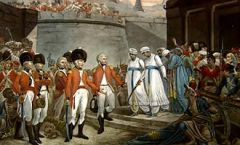
British East India Company
(1700s) |
Who: Trading company
What: Set up trading post in the coastlines of India, and later, merchants began the outright conquest of India. Where: India When: 1700s Why: It lead to Indian revolt against the company, in which the British waged a bloody campaign against them. Later, the company was abolished by the British government, and assumed direct rule over India, which totally transformed them. |
|
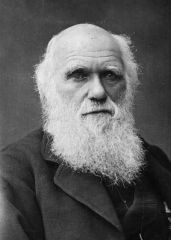
Charles Darwin
(1800s) |
Who: English Biologist
What: Wrote the book, On the Origin of Species, which argued that all living species had evolved over thousands of years in a ferocious contest for survival. Species that adapted well to their environment survived, reproduced, and flourish, while the weaker ones went into extinction. AKA survival of the fittest Where: Europe When: 1800s Why: It is important because during the age of imperialism, Europeans were drawing from Darwinist ideas and applied them to the development of human society. Scientific Racists, as they were called, relied on his theories to explain the strong and the weak in human societies. Successful ppl and races had competed better in the natural world and consequently evolved to higher states than less fit people. People called it Social Darwinism, where they use his ideas to explain social conditions. |
|
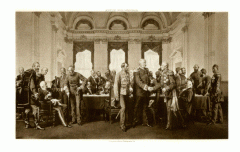
The Berlin Conference
(1880s) |
Who: European powers
What: devised ground rules for the colonization of Africa. They could establish African colonies after notifying the others of its intentions and occupying previously unclaimed territory. Where: Africa When: 1880s Why: They enforced colonial rule to the African colonies they claimed, which resulted in much resistance and instability within their borders due to displacement and the rules and taxes imposed on them. |
|
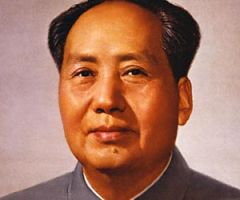
Mao Zedong
(Early 1900s) |
Who: leader of the Chinese communist movement
What: He came up with a Chinese form of Marxist-Leninism (Maoism), an ideology grounded in the conviction that peasants rather than urban proletarians were the foundation for a successful revolution in China. Where: China When: early 1900s Why: His Communist dictatorship rule resulted in many negative effects. He made into effect collectivization, and created a way of life for people that had extremely negative effects. His rule was responsible for many people dying and for starvation. It supported equal rights for women, Chinese authorities introduced marriage laws that eliminated such practices as child or forced marriages, gave women equal access to divorce, legalized abortion, and outlawed foot binding, a symbol of women’s subjugation. |
|
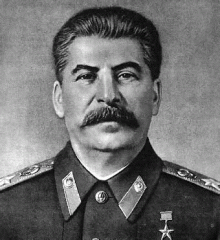
Joseph Stalin
(Early 1900s) |
Who: leader of Soviet Union
What: Turned Russia into a leading industrial power, called the First Five-Year plan. Integrated the collectivization of agriculture to increase the efficiency of its production, which angered the people and caused much disaster. Stalin later killed off any one deemed suspicious to his plans. Where: Russia When: Early 1900s Why: The establishment of the world’s first dictatorship of the proletariat challenged the values and institutions of liberal society all over the world and seemed to demonstrate the viability of communism as a social and political system. |
|
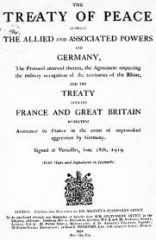
Treaty of Versailles
(1919) |
Who: peace treaty and the end of WWI
What: Ended the war between Germany and the Allied powers. It blamed the war on Germany, and held it responsible to cover all of the costs. It was denied remilitarization, and was forced to let go of substantial territorial concessions. Where: Germany When: 1919 Why: This is important because this harsh treaty is what led up to WWII. The Allied powers blamed Germany for the war and made them pay for all of the expenses, leading to the collapse of its government and rise of the Nazi power. |
|
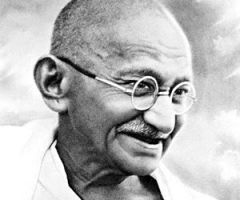
Mahatma Gandhi
(1920s) |
Who: Indian leader
What: Made Indian National Congress into a mass movement, and promoted non-violent protests. He believed that if people boycotted British goods, it would help India be self-sufficient, thus allowing it to be self-governed. Where: India When: 1920s Why: The British parliament enacted the Government of India Act, which gave India the institutions of a self-governing state. |
|
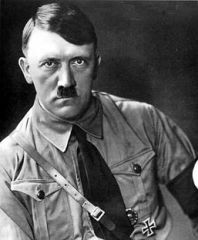
Adolf Hitler
(1940s) |
Who: Nazi leader
What: Systematically undid the Treaty of Versailles and the fragile peace of the internal war years. Shaming Germany only made it want to rebel and rise against those who put it down. He rejected democracy and promoted dictatorship. He went against the treaty and secretly began a military in Russia, so as to “unify” Germany once again, and getting rid of the “enemies from inside”, by completely exterminating them. They invaded European countries so as to expand German rule. German fell under communist rule leading to WWII. Where: Germany When: 1940s Why: He wanted to unify Germany through the expansion of its military in order to invade European countries, and exterminated all Jews, which resulted in the Holocaust. Over 60 million people died as a result of WWII. |
|
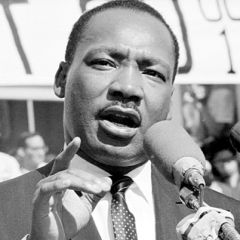
Martin Luther King, Jr.
(1960s) |
Who: African American Civil Rights Leader
What: Helped to advance civil rights using nonviolent civil disobedience. Where: America When: 1960s Why: Helped to pass the Civil Rights Act of 1968 that helped to combat discrimination and end segregation, thus giving African Americans the same rights as whites. |
|
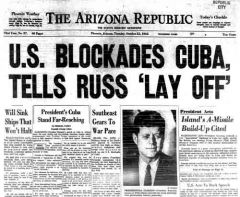
Cuban Missile Crisis
(1960s) |
Who: USA, Cuba, USSR
What: Fidel Castro denounced American imperialism and accepted assistance from the Soviet Union. They accepted missiles from Russia. After failing to overthrow Castro, John F. Kennedy told the public of the nuclear missiles, telling the Soviet Union to withdraw them, and imposed an air and naval quarantine in Cuba. Where: Cuba When: 1960s Why: This demonstrated the cold war rivalries between the Soviet Union and the United States and how they drew other areas of the world into their orbit. It was the closest the world has ever gotten to nuclear war. |
|
|
What economic, political and technological conditions made the Imperialism of the late 19th and 20th centuries possible? Why was the creation of global empires by the nations of the industrialized West different than earlier forms of imperialism, and how does the legacy of Imperialism continue to affect the historical development of the nations of the developing world?
|
Since Europe was a trading empire, each European state wanted to conquer as many developing nations as they could in order to establish trading posts to buy and sell goods at. They each wanted to control the different resources in each country because they needed them to support their Industrial Revolution. The Industrial Revolution provided them with new technology that makes their global empires possible such as communication and steam engines, allowing faster ways of communication and travel. It also gave them advanced military technology. Since it was a trading empire, they needed a large navy to protect that power, so they controlled certain lands to create support bases for fueling. Also, before the invention of certain technologies, Europeans could not explore much of Africa because of disease. They did not know what was there until they created tonic water that protected them from Malaria. They also had access to weapons, so if native people tried to resist them, they had weapons like the machine gun that could easily kill them off.
Earlier forms of imperialism refers to the domination over subject lands in the larger world, while the formal imperialism relied on the domination of trade, investment, and business activities that enabled imperial powers to profit from subject societies and influence their affairs without going to the trouble of exercising direct political control. The legacy of imperialism affects the historical development of the nations of the developing world because it brings to them many Western ideals, such as culture, government, and education. These nations are heavily influenced by Western way of life. |
|
|
Describe the military and diplomatic conditions that led to the outbreak of World War One in August 1914. What made this war fundamentally different from earlier wars? How did the Treaty of Versailles that ended the war contribute to the causes of World War Two?
|
WWI begins with an act of terrorism in the Balkans, which was dominated by the Muslim Ottoman Empire. The Ottman Empire was declining since all the countries it once dominated were now gaining independence. These were taken by the Austrian Empire, which was composed of people of different cultures under one power. The idea of nationalism made the Austrian Empire dislike their rule. Serbia in particular was unhappy because they had Serbian speakers in Austrian territory. They wanted that land to be part of Serbia, so Serbian nationalist (terrorists) murdered Franz Ferdinand, the Archduke of Austria. Austria then wants to punish Serbia with war, but since Serbia was an ally with Russia, Russia ended up mobilizing their army in order to protect Serbia. Germany, at the time, was planning to take France and Russia, and mobilized their army when Russia mobilized theirs. Germany then declared war on Russia because it didn’t halt their army. Germany’s plan was to capture France through neutral countries, like Belgium. Britain swore to protect these neutral countries, so when Germany invaded, they declared war as well. This system of alliances is what made this into a world war.
What made this war so fundamentally different from other wars was the advancement of technology. With weapons such as the machine gun, barbed wire, and mustard gas, casualties skyrocketed as soldiers were much more easily slaughtered on both sides of the war. The Treaty of Versailles that ended World War I actually set into motion World War II. The treaty blamed Germany for the war and held it entirely responsible. They forced them to pay for all the damages, which deeply humiliated Germany. It also wanted to make their military vulnerable by not allowing them to any new weapons, or vehicles so they would not invade their surrounding countries. As Adolf Hitler came into power, he blamed democracy for the humiliation, saying that it was a failure and weak. He also believed that Germany would have won the war if it were not for the enemies within, which included Jews, Communists, and Socialists. All of this set into motion the events that would eventually lead to World War II. |
|
|
How did the political and military conditions at the end of World War 2 lead to the Cold War? How did the rivalry between the United States and the Soviet Union express itself during the Cold War? Do you think that the Cold War created a stable or unstable global security situation?
|
After WWII, the United States and the Soviet Union are the two superpowers that rise because of their strong militaries. They did not have such a great relationship because they did not have any shared values that tied them together, such as government, culture, or history. This created suspicion between the two countries. Russia felt vulnerable because of the large number of casualties it had after the war, so it set up Communist puppet states in Europe so in case of another war, it would take place in Europe and not Russia so as to protect themselves. They both began to sacrifice their peace for their own national interests, creating a hostile competitive relation between them, which divided Europe. The Cold War came about as a misreading of each other country’s intentions and the desire for each to be the better of the two superpowers.
A central feature of the cold war world was a costly arms race and the terrifying proliferation of nuclear weapons. This lead to the creation of two military blocs: the North Atlantic Treaty Organization, and the Warsaw Treaty Organization. Both sides amassed enormous arsenals of thermonuclear weapons and developed a multitude of systems for deploying those weapons. Each also wanted to be in the lead when it came to technology, thus set into motion the “space race”, in which both the Soviet Union and the United states competed with the launching of satellites and astronauts into space. Each superpower would also get involved in proxy wars, in which they supported their enemy’s enemy and avoided direct conflict with them. The US paired with Afghanistan against the Soviet Union, while the Soviet Union paired with China and Vietnam against the United States. I believe that the Cold War helped to create a more stable security system because it helped to order and define the world for almost fifty years. This war was not a violent war and was more of a competition between the two superpowers. Each wanted to be better than the other for fear that the other would harm it. Although this is not necessarily the intention of the US or USSR, it helped them to establish better technology to protect themselves, to better themselves, and to stabilize themselves as well. It created a sense of purpose and identity for the people in a non-violent way. |
|
|
What do you think “Globalization” means? What effect on the world do you think globalization has had already? What effects can you foresee in the future if theses trends continue? Do you think that these trends will produce more stability or instability for the world overall?
|
Globalization is the spread of ideas and products throughout the world. It has an economic effect, for example, in which jobs in developed countries are outsourced to developing countries. It has an effect on global systems in terms of information connectedness. We all can know about things around the world so quickly in regards to climate, natural disasters, and news. It also has a major impact on culture, where movies, music and art are popularized in many different countries around the world.
I foresee that the world will eventually be integrated with influences from all around the world. It is not just Western ideas and items that are being globalized, which is what many anti-globalists believe. Things from developing countries as well are being globalized. For example, with immigration skyrocketing in the United States, these people bring along with them their cultural values and traditions, and thus influencing those around them. The United States is accepting of cultures from around the world, thereby diversifying it largely. With the integration of the internet, more and more people are learning of what is out there in the world besides what they have in their own country, and this can ultimately affect their decisions as to what opportunities they have, ideas they can develop, and ways they can ultimately choose to conduct their well-being and lifestyle for self advancement. I believe that this can help to bring about more stability for the world overall. They are able to accept worldwide views and come to understanding of other cultures. People are able to define themselves rather than letting others define who they are. Globalization, I feel, will not harm people, but will help to benefit them in the end. People will be more understanding of each other’s culture and lifestyle, and I feel that with understanding comes peace. |

